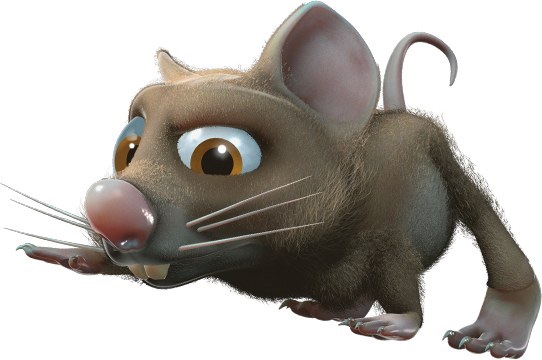House Mouse Facts
Though the house mouse isn’t native to this country, it’s found all across North America. They mate year-round with multiple partners. In the wild, it is possible for some mice to live up to 18 months, and five years in captivity. They love to eat seeds, roots, leaves and stems, as well as beetles, caterpillars and even meat. In your home, they’ve been know to eat glue, soap and other things found around the house. To communicate with each other, mice will often squeak. They have great vision and hearing. House mice, like other species of mice, use their whiskers to feel their way around surfaces.

House Mouse Infestation
If you’re living in a place that is warm and protected from the elements, you might have house mice. They love not only homes, but cabins, garages, attics, sheds, office buildings, and warehouses as well. You might hear squeaking, scampering, or gnawing between walls, ceilings, or floorboards. Their droppings will be deposited in cabinets, drawers, sinks, or near food. The smell of urine may also be present. House mice nests are usually made of paper and shredded materials. Look for gnaw marks on packaging, cables, and cabinets.
House Mouse Damage
These mice can ruin items you have laying around your house when they are seeking out places to nest. They can gnaw holes in woodwork, siding, sheetrock, insulation, packaging, furniture, and sometimes even copper pipes. These mice can further chew wiring, which may cause a fire or short-circuit electrical systems. Nests may also block vents, creating another potential area where fires may start. They can also dig up seeds in newly planted gardens when they are looking for food. It’s not uncommon for mice to eat human foods, either. Cereal and grain are some of their favorites, along with corn and seeds. When they feed on these items, they usually become contaminated. House mice can also carry lymphocytic choriomeningitis virus, a disease that can cause fever, lack of appetite, chest pain, and sore throat. This can last up to three weeks, but is not usually fatal.
Types of House Mice
House Mouse Identification
Although difficult to spot at first, there is a difference between mice and rats. The common house mouse measures three to four inches long, has gray or brown fur, and a hairless tail. The house mouse is also known as the domestic house mouse and the brown mouse.
House Mice in the Walls & Home
House mice love sheltered locations to make their nests and you may need to get rid of mice in the walls and attics. Usually you’ll smell mice when they are active in your walls as they give off a musky odor. They are most active at night, but can be seen during the day occasionally when in search of food.
Frequently Asked Questions
What do house mouse droppings look like?
House mouse droppings are very tiny — approximately three to six millimeters. House mouse droppings are shaped like grains. They have a black color to them and are usually concentrated near breeding or nesting grounds.
How do you control a house mouse infestation?
You’ll want to make sure your home is clean and free of cracks that the mice can enter through. If you’re cleaning an area where droppings are prevalent, wear a mask and rubber gloves. Wetting these areas with a water or bleach solution and then wiping it up with a damp sponge instead of sweeping them will prevent viruses contained in them from becoming airborne.
Store food or other organic materials mice may eat in plastic containers, and clean up any loose crumbs or spills.
Removing their nesting sites by getting rid of clutter, firewood, and garbage. If necessary, you can install traps that will kill them with bait, or capture them to be released.
What are the benefits of professional house mouse pest control?
Finding and removing any type of mouse infestation can be challenging, especially if there are numerous nesting sites in the attic, basement, or walls of a business or home.
Expert pest specialists have the educational background, equipment, and skill to control and remove rodents from a property in a safe, efficient way.
If you’re struggling with rodents like house mice on your property, contact us. Our technicians can remove the critters and help you regain control of your property and sanity.


